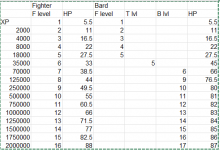There's a big yes, but ... to that.
Levelling in 1e could never be done in media res. By this, I mean that trying to compare exact XP amounts is never accurate ... to the extent you were actually following the rules even a little. And if you weren't following the rules - and doing some sort of "levelling by milestone," for example, then the problem is worse (because everyone advances, amirite?).
Let me explain. As soon as you hit the requisite number of XP for your next level in AD&D, you stopped accumulating more XP. Full stop. You do not gain more, you do not pass go, you do not collect $200.
You are only eligible to advance a level. You do not gain that level until you spend the time and money to advance the level (which is a decent expenditure of weeks and gp). Bards, of course, have to not just pay their college tuition (heh), but also 50% of all the money they gained while adventuring (yep, even AD&D screws college kids, but since they're Bards, I approve).
Anyway, the point is this- if you're in the middle of an adventure and you hit your level goal, you stopped gaining XP while everyone else continued to gain. This is why the advantages of some classes in having low XP amounts wasn't that great in practice ... but it also prevented mixed-class parties from "levelling up" the lower classed characters among them. That said, it did provide a mechanism to ensure that levelling was capped at a reasonable pace and you didn't just zoom from level 1 to level 6 from finding a dragon hoard.
TLDR; if you were using the level rules for XP, the person trying to be a bard would always be capped out in adventures, and other PCs wouldn't want to take weeks off all the time to level them up in the middle of an adventure.



